Emphasizing the importance of continued support for career and technical education to help grow the middle class, U.S. Representative Raja Krishnamoorthi (D-IL 8th District) last week visited the innovative learning labs at the College of DuPage Technical Education Center. The center, located on the College’s Glen Ellyn campus, includes 31 classrooms, 16 state-of-the-art laboratories to accommodate Read more
LEED
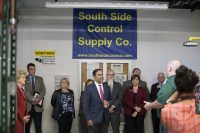
Emphasizing the importance of continued support for career and technical education to help grow the middle class, U.S. Representative Raja Krishnamoorthi (D-IL 8th District) last week visited the innovative learning labs at the College of DuPage Technical Education Center.
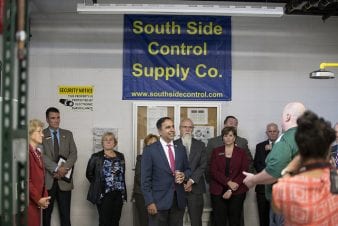 The center, located on the College’s Glen Ellyn campus, includes 31 classrooms, 16 state-of-the-art laboratories to accommodate 1,400 students, as well as space for raw material and vehicular storage. In addition, an adjacent greenhouse provides a hands-on laboratory for Horticulture students.
The center, located on the College’s Glen Ellyn campus, includes 31 classrooms, 16 state-of-the-art laboratories to accommodate 1,400 students, as well as space for raw material and vehicular storage. In addition, an adjacent greenhouse provides a hands-on laboratory for Horticulture students.
Home to the College’s Architecture, Interior Design, Horticulture, Automotive Technology, Computer-Aided Design, Construction Management, Electro-Mechanical Technology, Electronics-Integrated Engineering Technology, Manufacturing Technology, Welding Technology, and Heating, Ventilation, Air Conditioning and Refrigeration programs, the LEED-certified center features two windmills and four solar panels on its roof to provide students with hands-on study of emerging wind/solar energy technologies.
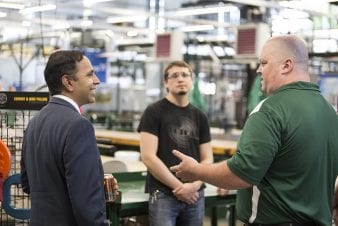 “Everywhere I look, I see a glimpse of something even more interesting, even more innovative, even more thought provoking,” said Krishnamoorthi. “I am proud of what you are doing (at College of DuPage) and what we’re accomplishing in Washington to create more job training and job opportunities to help grow the middle class.”
“Everywhere I look, I see a glimpse of something even more interesting, even more innovative, even more thought provoking,” said Krishnamoorthi. “I am proud of what you are doing (at College of DuPage) and what we’re accomplishing in Washington to create more job training and job opportunities to help grow the middle class.”
The Carl D. Perkins Career and Technical Education Law is the primary federal funding vehicle for skills-based education in the country. Krishnamoorthi and Glenn “G.T.” Thompson of Pennsylvania championed the Strengthening Career and Technical Education for the 21st Century Act, a bipartisan bill and the first reauthorization of the Perkins CTE Act since 2006. Both the House of Representatives and Senate passed the new act, nicknamed Perkins V, and at the end of July, it was signed into law and will go into effect July 1, 2019. Funding will increase during these years, up to $1.3 billion by 2024, while major reforms strengthen what is in place, including special emphasis on career paths.
In FY19, College of DuPage received $1.403 million through a formula that considers the number of students eligible for Pell grants who declare interest in a CTE program. Perkins funding plays a key role in programs throughout campus, including the HVACR program where funding has enabled students to build their own systems trainers.
“Everything you see in this lab is built by our students, not contractors,” said HVACR Program Coordinator Bob Clark. “Everything from the pumps, to the concrete poured for the bases, to all the piping systems that you see running in the lab and students have to manage that so that it’s comfortable.
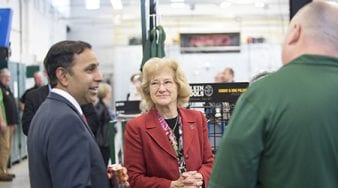 College of DuPage President Dr. Ann Rondeau applauded Krishnamoorthi and his colleagues for their diligence in crafting a supporting bipartisan legislation that directly benefits job seekers.
College of DuPage President Dr. Ann Rondeau applauded Krishnamoorthi and his colleagues for their diligence in crafting a supporting bipartisan legislation that directly benefits job seekers.
“Your dedication to workforce development is to be commended,” she said. “You have been so helpful and a great leader in securing more Perkins funding, which College of DuPage and other institutions may use, in turn, to provide skilled workers to a number of industries.”
Learn more about Career and Technical Education at College of DuPage.
College of DuPage is regionally accredited by the Higher Learning Commission. Serving approximately 25,000 students each term, College of DuPage is the largest public community college in the state of Illinois. The College grants seven associate degrees and offers more than 170 career and technical certificates in over 50 areas of study.
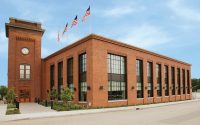
The Taco Innovation and Development Center (IDC), which opened in mid-2012, has been awarded LEED Gold certification by the United States Green Building Council (USGBC). The 24,037-sq.-ft. facility, which houses classrooms and meeting spaces for training and educational purposes, achieved 62 points out of a total of 79 possible points for LEED Gold. Read more
The Taco Innovation and Development Center (IDC), which opened in mid-2012, has been awarded LEED Gold certification by the United States Green Building Council (USGBC). The 24,037-sq.-ft. facility, which houses classrooms and meeting spaces for training and educational purposes, achieved 62 points out of a total of 79 possible points for LEED Gold.

Points were awarded under the following categories: Sustainable Sites (20), Water Efficiency (4), Energy & Atmosphere (15), Materials & Resources (6), Indoor Environmental Quality (10), Innovation & Design Process (5) and Regional Priority Credits (2).
The Taco IDC, in addition to its instructional/educational focus for both Taco employees and HVAC industry professionals who visit the facility, was designed to be a showcase for energy-saving and sustainable products and systems, which are visible throughout the building for close-up viewing, hands-on learning and teaching.
Products and systems installed in the IDC include chilled beams (active and passive), radiant ceiling heating and cooling, fan coils, water-source heat pumps, perimeter radiation, radiant-floor heating, solar hot water, snow melt and geothermal. The mechanical design goal was to optimize hydronic-side design and remove/add as much heat as possible using chilled beams, flat-panel radiation along the IDC’s walls, and radiant floor systems. All equipment and systems are controlled by Taco’s proprietary iWorx Web-based building management product line and monitored by a host of sensors and meters throughout the building.
Taco achieved 15 out of a possible 20 points total in the Energy & Atmosphere category and 8 out of 11 possible points for optimization of energy performance. In fact, the IDC’s operation performance since its opening has exceeded expectations.
The performance of the IDC mechanical and electrical systems are monitored continuously via dedicated measurement and verification systems. Since the building was completed several new measurement stations were added including hydronic BTU metering systems, electrical sub-meters and building automation monitoring systems. These measurement systems have allowed Taco to monitor energy consumption in real time and compare those actual energy measurements against the initial energy model. All indications are that the building is meeting or exceeding the projected energy savings.
For example, during the period from September 1, 2014 to December 31, 2014 the building consumed 126,290 KBTU from the hot water heating system or approximately 150,345 KBTUS of natural gas at 84% boiler efficiency. Taco estimates that this is approximately 75% of the annual gas consumption for heating BTUS. Natural gas consumption prorated for the entire year is approximately 200,460 KBTUS. The energy model predicted that the building would consume 296,900 KBTUS annually. The actual consumption is estimated at 67.5% of the projected consumption. These numbers will be refined as more data is collected.
In considering its LEED application, Taco’s objective was always to implement a system approach to achieving energy efficiency rather than chase individual LEED points. The company wanted to design the most efficient building possible and to see how the design translated into LEED points.
At the time of construction, project manager Chris Integlia, Taco’s executive vice president, said, “Our approach to this project has always been to have LEED certification as a public validation of the efforts we’ve put into the project, and as a confirmation that our products and technologies will help not only Taco but others in our industry achieve highly sustainable green buildings.
“We’re going to do the right things by Taco, and we’ll see how far we can go with that in terms of the LEED scorecard. We do know, however, that the products and technologies we intend to put into the building will achieve a very high level of certification.”
The IDC has been a busy place since it opened and has provided training and education to Taco’s workforce as well as more than 3,000 visitors attending over 50 courses for both residential and commercial training.
The IDC is the second LEED certified project for Taco. In 2009 the company received LEED certification for a new 60,000-sq.-ft. warehouse-distribution center addition to its facility.
